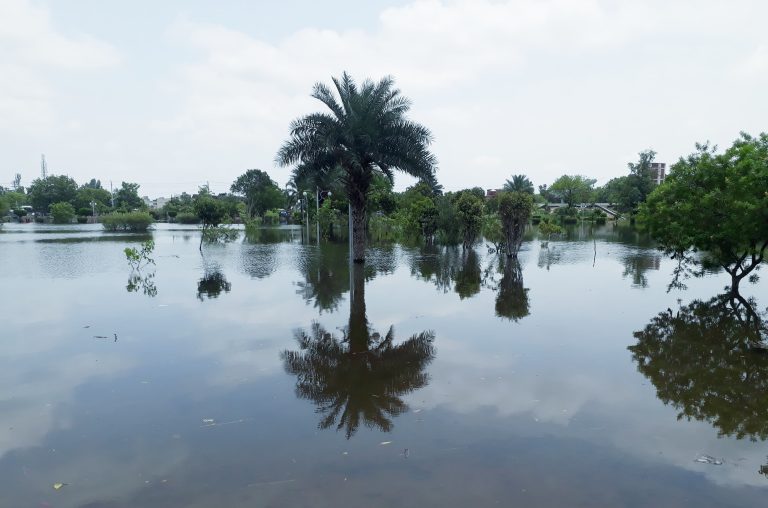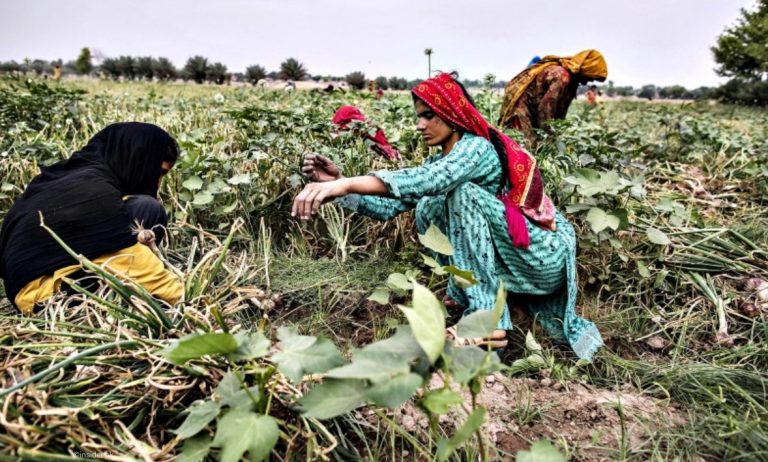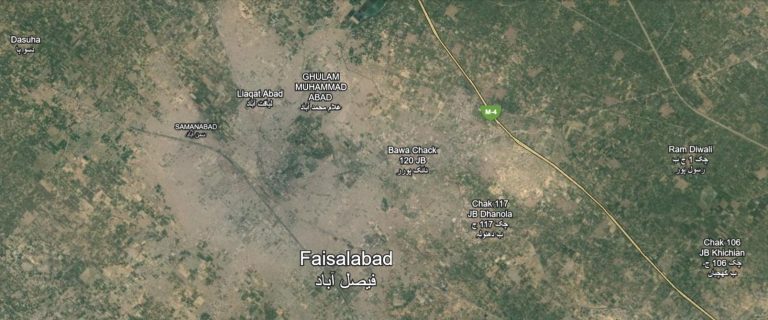Vanishing Orchards, Rising Risks: Climate Change Tightens Its Grip on Khyber Pakhtunkhwa
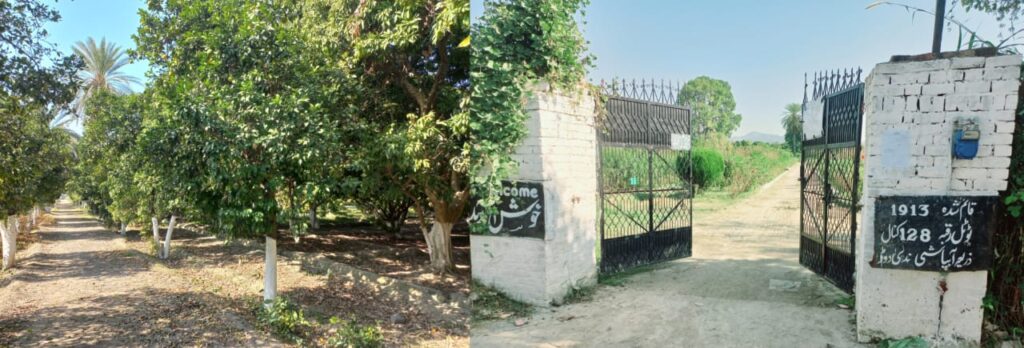
Deforestation and the steady decline of orchards in Khyber Pakhtunkhwa (KP) are fueling the intensity of climate change across the province. Over the past 35 years, cultivated land has shrunk from 1.88 million hectares to 1.82 million hectares, with orchards bearing the brunt of this loss. Much of this decline is due to agricultural land being converted for residential and commercial use, while poor-quality pesticides and inadequate maintenance have further reduced orchard productivity.
Orchards play a vital role in mitigating climate change. Trees absorb carbon dioxide, a major greenhouse gas, and release oxygen back into the atmosphere. They also provide natural cooling through evaporation, helping to lower temperatures during deadly heatwaves. By absorbing rainwater, orchards reduce the risk of floods, while their roots stabilize soil and prevent erosion—especially important as heavy rains and droughts become more frequent under changing climate patterns. In addition, orchards filter pollutants from the soil and act as safe habitats for plants and animals, protecting biodiversity that is under increasing threat.
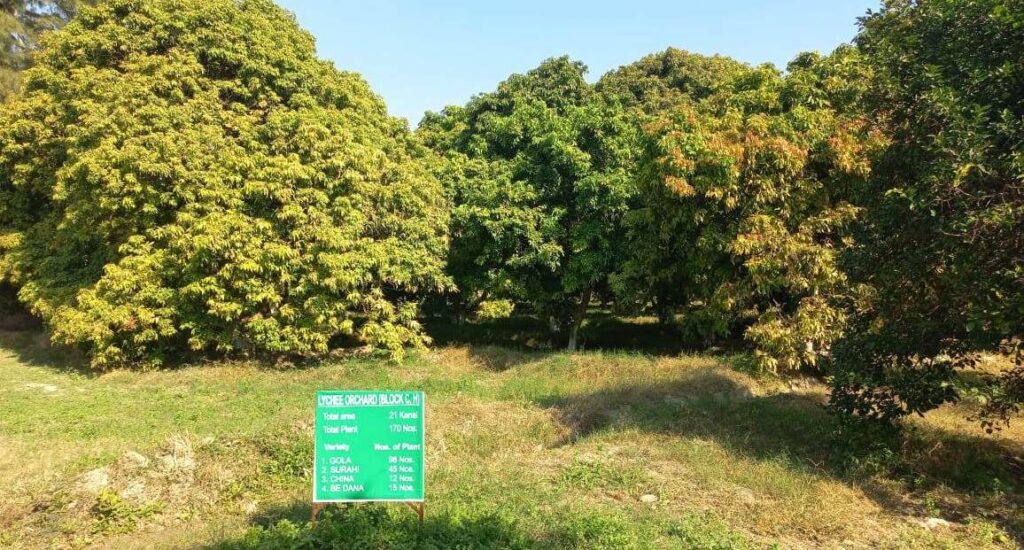
Orchards as Climate Shields
Muhammad Afser, District Coordinator of the Welfare Association Jareed, confirms that the decline of orchards has already altered long-term weather patterns. “Rising temperatures and melting glaciers are bringing disasters such as floods, soil erosion, and rising sea levels, all of which pose severe risks to life and human survival,” he said. Afser added that climate change is depleting the ozone layer, allowing dangerous ultraviolet and infrared rays to strike the earth directly. “Unseasonal heavy rains, cloudbursts, harsher weather shifts, and prolonged droughts are all symptoms of climate change,” he warned.
Afser emphasized that expanding orchards is one of the most effective ways to curb the harmful impacts of greenhouse gases. “Through photosynthesis, plants not only produce oxygen but also release moisture into the air, which helps stabilize the ozone layer and regulate temperature. Maintaining oxygen levels is critical to keeping ecosystems livable, and that is only possible with more trees and orchards,” he explained.
He further noted that orchards contribute directly to human well-being by providing fruit rich in minerals such as calcium, potassium, and sodium—essential nutrients that serve as natural alternatives to supplements. “Healthy orchards mean healthy people and a climate system more resilient to shocks,” he concluded.
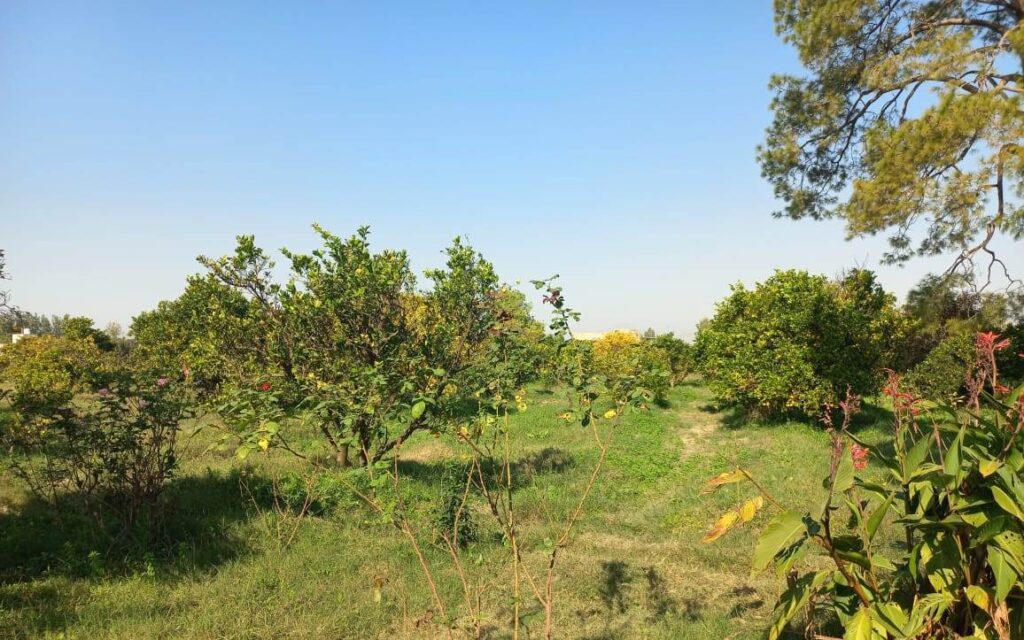
Fruit Yields Decline Amid Climate Change and Land Conversion
According to records obtained under the Right to Information from the Crop Reporting Services of the Agriculture Department, fruit production in both Rabi and Kharif seasons has shown a decline despite slight increases in cultivated area.
In Haripur district, during the 2023–24 Rabi season, orchards were spread across 762 hectares, producing 6,310 tons of fruit. In 2024–25, the cultivated area increased marginally to 766 hectares, yet production slipped to 6,307 tons. Rabi fruits in the district include kinnow (mandarin), loquat, guava, and others. Despite a 0.52% increase in cultivation area, production dropped by 0.048%, largely due to unfavorable weather during crucial fruit development stages. Shifts in rainfall patterns and rising temperatures linked to climate change are emerging as critical challenges for orchard productivity.
Similarly, in the Kharif season, fruits such as watermelon, melon, apricot, banana, apple, guava, pear, peach, plum, and pomegranate are cultivated. In 2024–25, 580 hectares of land yielded 4,887 tons, compared to 581 hectares producing 4,898 tons the previous year. This reflects a 0.17% decrease in cultivated area and a 0.22% decline in output.
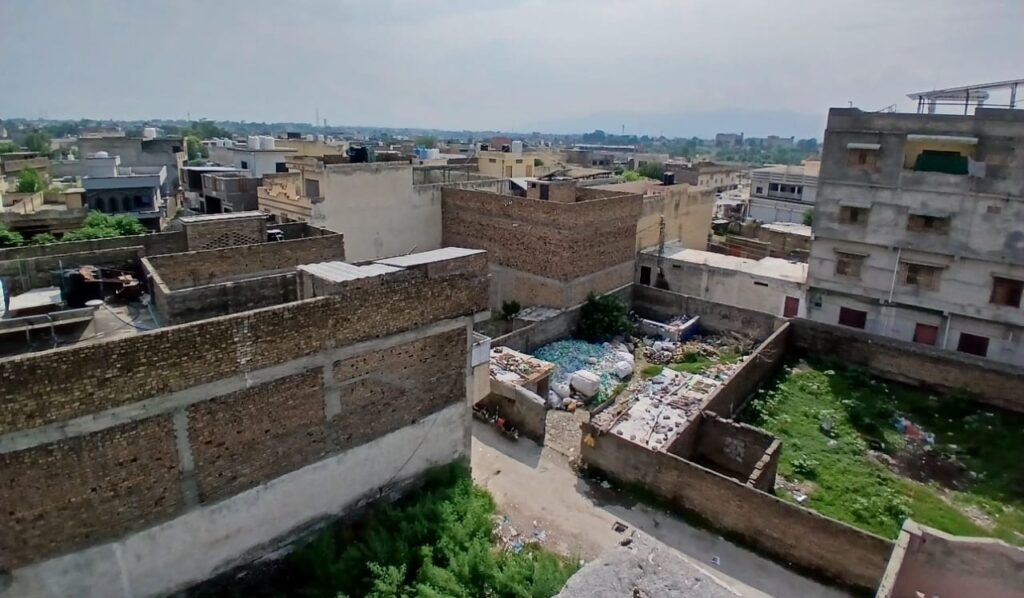
Vanishing Green Cover
Prof. Dr. Abdul Majid, Director of the Institute of Management Sciences, University of Haripur, said that to fully understand climate change, one must also examine its political and economic roots. “Industrialization, which began in the 1880s and peaked by 1980, left devastating global impacts. Developed countries reaped the benefits and later shifted industries elsewhere, while blaming developing nations for emissions. The reality is that most developing countries did not cause climate change but are suffering its worst consequences,” he explained.
He pointed out that Pakistan contributes less than 0.1% of global CO₂ emissions, yet ranks among the most climate-vulnerable nations. “There is a severe lack of planning to confront climate threats in Pakistan. Even existing laws and policies are poorly implemented, worsening the crisis,” he added.
Highlighting Haripur’s local context, Dr. Majid said that just two decades ago, hundreds of kanals of land near the city were covered with orchards. Today, most of that land has been converted for residential and commercial construction. Many orchard owners, seeking higher profits, have replaced fruit trees with cash crops or vegetables.
He further explained that globally, an area with 20% or more tree cover qualifies as a forest. “London is called an ‘urban forest’ because 21% of its land is under trees. Trees don’t need to be in dense jungles; they can be planted in front of homes, along streets, or around playgrounds to provide the ecological benefits of a forest,” he noted. However, Pakistan’s forest cover remains well below this global threshold, leaving it short of even the basic definition of a forest.
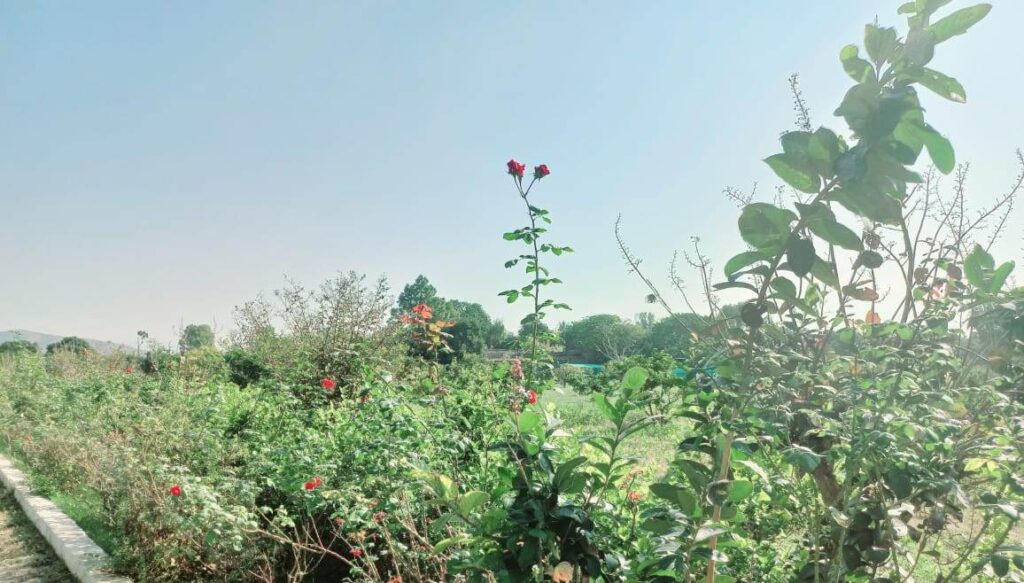
Government Measures to Protect Orchards and Regulate Land Use
Speaking about government initiatives, Deputy Director Plant Protection, Insha Gul, said that free saplings are being distributed among farmers and landowners to mitigate the harmful impacts of climate change. “For the healthy growth of orchards, our field staff provides detailed guidance, consultation, and awareness. Experienced teams map out designated areas for orchards, assist in land preparation, and offer solutions to problems such as plant diseases and nutrient deficiencies,” she explained.
She added that the government is focusing on cultivating oilseed crops such as olive, sesame, and sunflower—not only to generate environmental benefits but also to boost food security. However, she pointed out a pressing challenge: because fruit and vegetable crops have longer production cycles, many landowners near cities are converting orchards into residential or commercial developments.
Providing details about Haripur, she noted that in 2023, orchards were planted on 120 acres, including peach and kinnow (mandarin) on 50 acres each, and olive on 20 acres. In 2024, the total orchard area fell to 95.5 acres—with peach and olive cultivated on 26 acres each, and kinnow on 43.5 acres. So far in 2025, only 32 acres of orchards have been established, including 24 acres of kinnow, six acres of peach, and two acres of olive. Additionally, 40,000 olive graftings have been carried out to promote long-term sustainability.
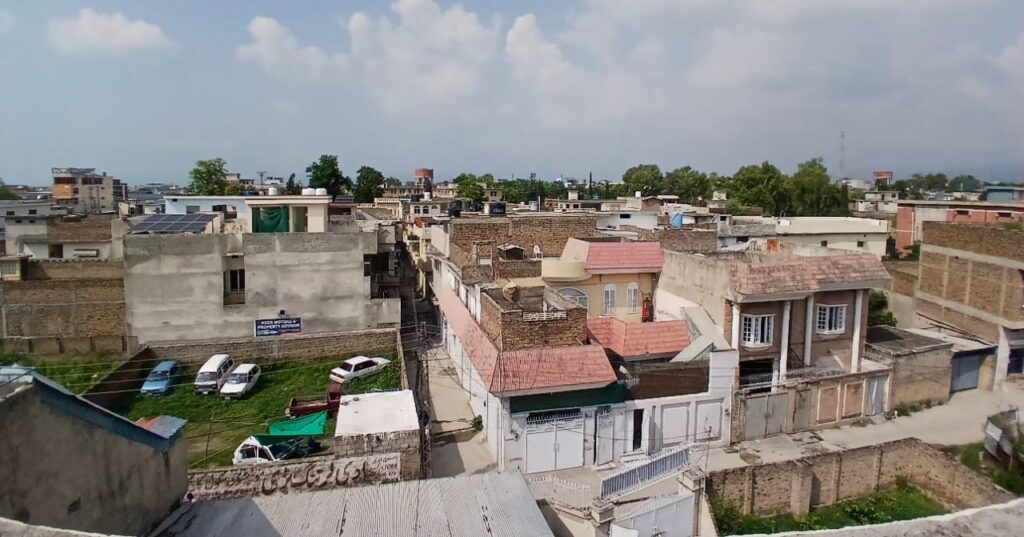
Weak Enforcement Undermines Land Use Law
Legal expert Haq Nawaz Safdar Advocate emphasized the importance of curbing illegal housing schemes and commercial encroachments on agricultural land. He referred to the Khyber Pakhtunkhwa Land Use and Building Control Act, 2021, which aims to regulate urban expansion, establish systematic land use, and promote master planning across the province.
“Under this law, the Provincial Land Use and Building Control Authority operates under a council chaired by the Chief Minister. At the district level, local planning committees have been formed to monitor the use of land for agriculture, housing, and commercial purposes,” he explained. Violations of the Act carry penalties of up to 10 million rupees and three years’ imprisonment.
He cited enforcement actions to date, including 126 violations in Mansehra, where 14 FIRs were registered and Rs. 4 million in fines were collected. In Haripur, 33 housing schemes have been declared illegal. However, Safdar argued that the Act has yet to be fully implemented across the province. “In many districts, master plans remain incomplete, committees have not been formed, and neither citizens nor builders have been adequately informed about the law. A shortage of resources also hinders proper enforcement,” he said.

Youth-Led Climate Summit to Tackle Environmental Challenges
To raise awareness about climate change among the younger generation, Hasan Nisar, Founder and CEO of Matrix Pakistan, announced that his organization will host a major Climate Change Summit in October. The event aims to promote tree plantation, natural resource conservation, and youth participation in safeguarding the environment. He said the summit will bring together experts, policymakers, and citizens on one platform to find practical solutions to the country’s growing environmental challenges. “We must understand that trees are our lifeline, and environmental protection is the only path to a secure future for Pakistan,” he emphasized.
Experts, meanwhile, stress that the government must take serious measures to expand and protect orchards and forests. They argue that the corporate sector should also be held accountable under Corporate Social Responsibility (CSR) frameworks—by shifting priorities from charity to investments in tree plantation and forest development projects.
Furthermore, they highlight the urgency of halting deforestation and enforcing the Land Use and Building Control Act 2021 to curb illegal constructions on agricultural land. Protecting farmland and expanding green cover, they argue, are crucial steps toward restoring eco.
The decline of orchards in Khyber Pakhtunkhwa is more than a local agricultural issue—it is a warning sign for Pakistan’s climate future. Without urgent interventions to curb deforestation, enforce land-use laws, and promote sustainable farming practices, the province risks losing not just its biodiversity but also its resilience against floods, droughts, and extreme heat. Community-led initiatives like youth climate summits, paired with stronger government enforcement and corporate accountability, can help restore balance. Protecting and expanding orchards is not just about fruit production—it is about safeguarding livelihoods, food security, and the very survival of future generations.


